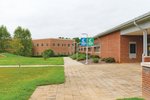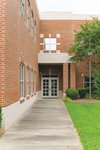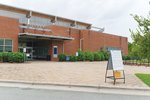


Many community colleges in North Carolina started classes this fall facing enrollment declines. That reality holds true at Central Carolina Community College’s campuses in Chatham, Lee and Harnett counties.
Typically, economic downturns result in increased enrollment at colleges, as people who are unemployed seek to increase their skills and employability — but the current downturn, resulting from the coronavirus pandemic, has been anything but normal.
Still, CCCC administrators and faculty say they’re not too worried about the enrollment drop. In spite of the challenges brought by adjusting to COVID-19 health and safety guidelines, CCCC’s semester has started fairly smoothly, with the majority of courses meeting virtually.
In Pittsboro, Mark Hall, the CCCC provost for Chatham County, said the college’s 9% enrollment decrease is not very concerning for two reasons: its a decline from the college’s all-time-high enrollment last fall and does not yet include registration for the college’s eight- and 12-week courses, which begin this month and in October.
“There is a little bit confusion about which classes are going to still meet in person and which classes are going to be online, but overall, it was it was pretty smooth,” Hall said about the college’s first week of classes, which took place from Aug. 17 to 21. “Most people seem to be pretty happy — I mean everyone I think would like to be in person but also recognizes the challenges we face what’s going on.”
The college is offering computer lab reservations and parking lot spots to access Wi-Fi for students who don’t have reliable broadband service at home. Courses that require the development of physical skills, such as construction or blacksmith classes, are still meeting in person — socially distanced, with masks and small groups of students. Hall said some classes — fewer than 10 — which were supposed to meet in person decided as a class that meeting online made more sense for transportation purposes and schedule conflicts with online classes later in the day.
For CCCC President Lisa Chapman, she is just excited to see more activity (safely) taking place on campus.
“I have enjoyed seeing several cars in the parking lot,” she said, “after a summer of seeing very few.”
Still, more people on campus means more potential for COVID-19 to spread, a common dilemma for higher education institutions.
“At the same time, I’m thinking, ‘Oh, no. There are more people on the campus.’ Because I feel very much responsible for all of those individuals and the decisions that we make,” Chapman added. “So it’s always, when we think of safety first and still try to meet the needs of the community — it’s such a balancing act.”
Carl Bryan, the program director for health and fitness science, has been with the college since 1992, when he was 24 years old. A little over a month before the current semester started, Bryan contracted the coronavirus — an experience he said that was “as horrible as everybody says.” Now safely recovered, he is teaching three out of his five classes in person twice a week, with attendees primarily meeting outside, wearing masks and socially distancing.
“My students in particular have been phenomenal about doing that,” Bryan said. “One of my students, he remarked, he said, ‘Thank God you’re doing this.’ And I was like, you know, it is so funny — in my teaching career, we struggle sometimes with attendance. Now they can’t wait to come, because it’s a big part of their day.”
Even though enrollment is slightly down, Hall said most current students chose to come back, and numbers are down related to potential students choosing to wait to enroll. Chapman said the college is working to continue student and community outreach, even though that looks much different under a pandemic.
“I believe we’ll see more and more people engage as they sort of come to grips with, OK, ‘This is the way it is this fall, we kept hoping it would be different but we need to go ahead and continue,’” she said. “Part of what we tell the students and we talked about with the family is we may be doing business differently, but we’re still in the business of student success.”
Anticipating the possibility of needing to further adapt in the future, Chapman emphasized how thankful she is for the people who make up CCCC.
“I am very, very proud of the way the college family has pulled together and the way our students are working. We’re fortunate that we have the support we do in this community, and we recognize that and we honor it,” she said.
Until the day all the college’s students can walk through campus mask-free — meaning COVID-19 is eradicated — professors like Bryan are aiming to uphold the CCCC’s sense of community, one extension of “grace and space” to students at a time.
“What was arguably taken for granted is now something precious to them,” Bryan said.
Reporter Hannah McClellan can be reached at hannah@chathamnr.com.